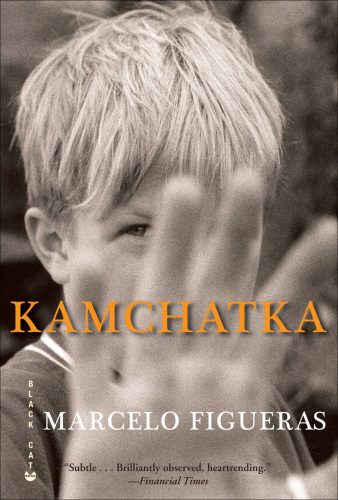
Kamchatka
- اطلاعات
- نقد و بررسی
- دیدگاه کاربران
نقد و بررسی

January 17, 2011
In this meandering English-language debut from Figueras, a 10-year-old Argentinean boy's whimsical inner life helps him both explain and digest his family's fate in the aftermath of the 1976 coup. When his parents' leftist activism forces the family into hiding, the boy decides to call himself Harry after his idol, Houdini. Ensconced in a villa outside Buenos Aires, Harry staves off the boredom of being in hiding by playing the board game Risk (his favorite territory being the novel's namesake), working out with the cool 18-year-old activist staying with the family, and fantastical forays into the lives of his various heroes—Superman, Aristotle, Arthur of Avalon—whose stories Harry relates to his own life with uninhibited passion. The reader knows from the first chapter that Harry's family will be torn apart, yet Figueras is intent on leaving out any "grown-up" facts that would explain the ordeal, focusing instead on Harry's reflections on the malleability of memory. Yet because of the narrator's young age, conclusions such as "Time is weird" might feel more astute if they were grounded in a more trenchant narrative.

February 15, 2011
A rich imaginative life helps a 10-year-old boy deal with the aftermath of Argentina's 1976 military junta, though American readers not well versed in the political history of the novelist's homeland might find some of this as perplexing as the narrator does.
Originally published in Spanish in 2003, this novel of very short chapters—few longer than a couple pages—follows the structure of a school day ("First Period: Biology," "Second Period: Geography" et al.). Yet such order is at odds with the chaos in which a politically active family finds itself following the coup. All sorts of people with whom the lawyer father had been associated were disappearing, and if the family didn't want to join the ranks of the disappeared, it must abandon its home for a series of mysterious safe houses, and assume a new identity in the process. For the boy and his younger brother (known throughout the narrative only as "the Midget"), there's a sense of adventure in all this, despite leaving friends and everything familiar behind. An avid reader and superhero fan, the boy rechristens himself Harry (after Harry Houdini) and finds symbolic refuge in the fantasy territory of Kamchatka, from the Risk board game which he plays with his father. "I believe all time occurs simultaneously," the narrator keeps repeating, the novel's mantra. And there are times when the narrative becomes unmoored from its chronological bearings, when the perspective is far more philosophically mature than that of a 10-year-old. "I believe that stories do not end, because even when the protagonists are dead, their actions still have an impact on the living. This is why I believe that History is like an ocean into which rivers of individual histories flow...We are bound together in a web that spans all of space—all living creatures are connected in some intimate way: a web large enough to include all those alive today, but also all those of yesterday and tomorrow."
A novel about the stories we tell ourselves to give shape and meaning to our lives.(COPYRIGHT (2011) KIRKUS REVIEWS/NIELSEN BUSINESS MEDIA, INC. ALL RIGHTS RESERVED.)

June 1, 2011
Bookstores are stocked full of bildungsromans, stories of exile, and political thrillers. Here, novelist, journalist, and screenwriter Figueras attempts to combine all three. The novel's narrator, a ten-year-old boy in Buenos Aires in 1976, knows and cares very little about the political situation or the dangers that force his family to skip town. Instead, he cares, like any other kid, about the ingredients of childhood--his best friend, Harry Houdini, and comic books. This tension between true danger and the boy's ignorance is fascinating. We learn of his parents' troubles--they are being hunted by the government for supporting the opposition--only through fragments of overheard conversation and our young narrator's educated guesses. The boy doesn't understand the gravity, so he fights for normalcy. Only in retrospect--too late--does he understand what his parents sacrificed for him. VERDICT Overwrought passages and long-winded philosophical asides--the adult narrator looking back--keep the reader from fully entering or caring about the story. In the end, this work doesn't stand out from similarly themed novels like The Kite Runner (more urgent) or Life of Pi (more original).--Stephen Morrow, Ohio Univ., Athens
Copyright 2011 Library Journal, LLC Used with permission.

April 1, 2011
In mid-1970s Buenos Aires, a 10-year-old boy dreams of his heroesSuperman, the Beatles, and especially Houdini. Political stuff is boring. Harry does not understand his parents passionate resistance. But then Mam is fired from her academic job, Pap cannot practice law, and the whole family must hide from the military junta. Can Harry become a real escape artist? Intensified by the childs innocent viewpoint, the horrific state terror of the disappeared is stark and immediate, more moving because it is presented without sentimentality. With wry comedy, Harry tells how his family drives him nuts, including Mam, who is a terrible housewife; his pesky little brother; and his grandmother, who thinks serious stuff makes you frown and gives you wrinkles. Is reality more improbable than his favorite TV show, Harry wonders. With a changed name in his new school, it is fun being a man of mysteryuntil it isnt. The story is framed by Paps last words to Harry. The tenderness breaks your heart.(Reprinted with permission of Booklist, copyright 2011, American Library Association.)




دیدگاه کاربران